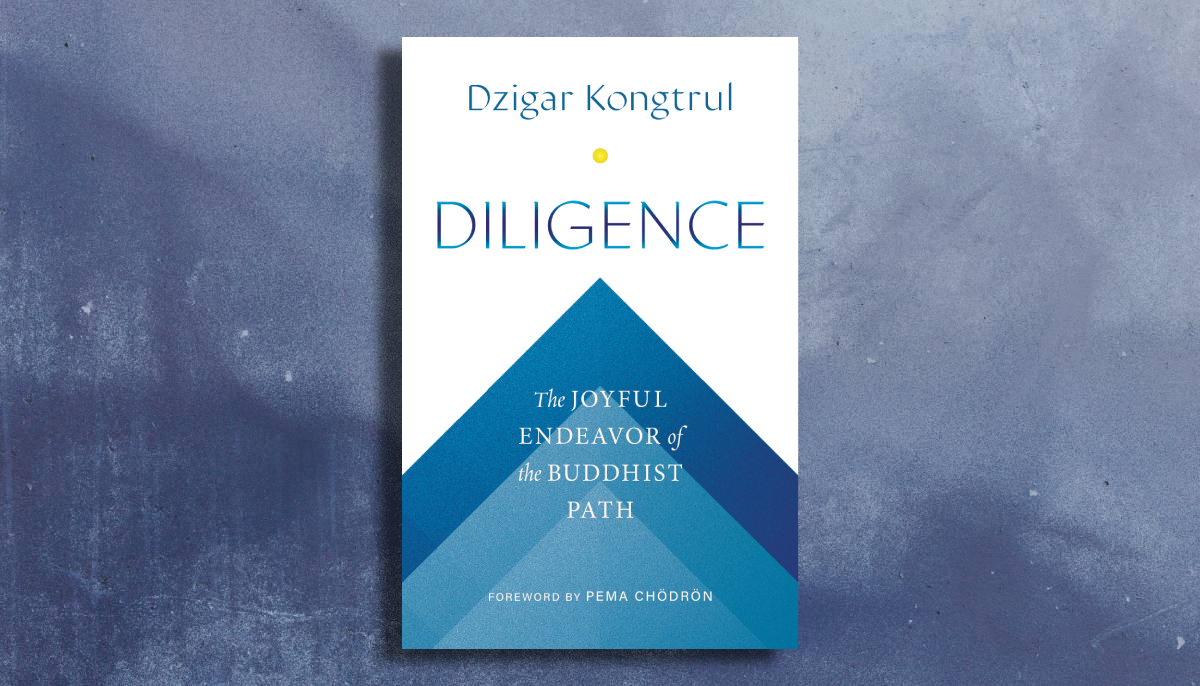Constance Kassor’s review for Buddhadharma:
For Tibetan Buddhists, few texts are as highly regarded as The Way of the Bodhisattva (Bodhicaryavatara), Shantideva’s profound eighth-century guide to living an awakened life.
This timeless classic lays out the path of cultivating the six paramitas — or perfections — that a bodhisattva develops on the journey to awakening. While renowned teachers like the Dalai Lama and Pema Chödrön have written comprehensive commentaries on the entire text, Dzigar Kongtrul’s Diligence: The Joyful Endeavor of the Buddhist Path focuses exclusively on the book’s seventh chapter, exploring the perfection of diligence.
Diligence, or tsöndrü in Tibetan, is described as finding joy in meaningful effort. It’s the antidote to laziness, which manifests as procrastination, distraction, or self-doubt. Kongtrul’s commentary skillfully unpacks all 76 of Shantideva’s verses on this topic, offering clear and relatable guidance on how to overcome the obstacles that laziness presents. He highlights how diligence empowers us to let go of bad habits and cultivate good habits, fostering confidence. Diligence emerges not only as a discipline, but as a joyful and liberating practice.
At its core, Kongtrul’s commentary offers much more than a simple explanation of a centuries-old Buddhist text from India. Diligence illustrates that even in our modern world, Shantideva’s teachings are as relevant as ever, and that diligence is not only the key to progress on the Buddhist path, but also a transformative tool for anyone striving to live a life of purpose and meaning.
Excerpt: The Diligence Chapter
1
Thus with patience I will strive with diligence.
For in such diligence enlightenment is found.
If no wind blows, then nothing stirs,
And neither is there merit without diligence.
This first verse in the Diligence chapter of The Way of the Bodhisattva concisely identifies our need for diligence or joyful exertion in all we endeavor to accomplish.
What is this diligence or tsöndru? As we have started to explore, diligence is the characteristic of a delighted mind sustainably engaged in an activity — not just any random activity, though. Diligence refers to the force that allows us to engage in virtuous activities with a buoyant, resilient mind. The tone of the mind is joyful, and that joy in virtuous activity is precisely what helps sustain our engagement.
If there is no wind, a sailboat will not function. It will stay stagnant and motionless in the water or drift wherever the current flows. Diligence is the wind that fills our sails and moves us forward on our path, supporting our progress in a positive, wholesome direction. Diligence or joyful exertion doesn’t stand by itself; it is always in relation to something we are trying to do. As we work on developing qualities of virtue — for example, when engaging the paramitas of generosity, moral discipline, patience, meditation, and wisdom — we need the paramita, or perfection, of diligence to follow through with them. Diligence is not only necessary on the spiritual path, it is essential for seeing any worthy activity through to its completion.
There are, of course, many ways we can follow through with something. We can force ourselves to do things with a goal in our mind; we can trudge through our obligatory tasks, resenting every step, but plodding along nonetheless; we can “grin and bear it,” pretending to like what we are doing but really just trying to get it finished so we can check it off our long to-do list. These examples all have a goal in mind requiring a certain kind of diligence, but this is not what the Buddha meant when he spoke of the perfection of diligence as the fourth paramita. That kind of diligence, which Shantideva expounds upon here in The Way of the Bodhisattva, has joy at its core. The paramita of diligence is a fully cognizant, joyful exertion toward the perfection of wisdom and compassion.
2
Diligence means joy in virtuous ways.
Its contraries have been defined as laziness,
An inclination for unwholesomeness,
Defeatism and self-contempt.
3
A taste for idle pleasure
And a craving for repose and sleep,
No qualms about the sorrows of samsara:
Laziness indeed is born from these.
Shantideva first identifies the joy that is integral to diligence, and then outlines the very thing that hinders the accomplishment of our aspirations: laziness. As we discussed, the Buddhist teachings identify three categories of laziness or internal obstacles that we can encounter in our life and on our path:
1. Jéluk gi lélo: Attachment to sleep, getting “rest,” leisure time, or a yearning for idleness.
2. Jawa ngenshen gyi lélo: Attachment to mundane distractions, or the laziness of unwholesome ways.
3. Daknyi nyépé lélo: Habitual self-denigration, low self-esteem, self-loathing, or defeatism.
As we explore these obstacles in more detail, it is important to keep in mind that laziness itself is not necessarily the core issue — laziness is a symptom. The root of our laziness is our shenpa, or our unchecked, often unconscious preferences and attachments that extend and pervade into various activities and habits, preventing us from accomplishing what we wish. Shenpa is often translated as “attachment,” but it is deeper than that. We often have a visceral, though largely unconscious, level of preference for how we want things to be. This preference can express itself as either attachment or aversion — the word shenpa can refer to either of these expressions. Before we become more conscious and mindful of our thoughts and emotions, our shenpa can reveal itself in various forms of dissatisfaction, restlessness, and distraction, which can translate into one of the three types of laziness.
One place our shenpa can manifest is our reluctance to honestly reflect upon impermanence and the suffering of samsara. For many of us there is a great deal of discomfort and fear in contemplating or taking these teachings to heart. As an example of this, we may for the moment be enjoying relative comfort and ease. Intellectually, of course, we know how quickly circumstances can change — we see this with others, we read about it in the news, and we may have already experienced this ourselves or through loved ones. Our shenpa or preferences, however, keep the possibility of impermanence and change at arm’s length. We know that death is coming closer with each passing day, but instead of being realistic about this, we opt to numb out in distractions or avoidance or simply give up without even trying to do something meaningful with the rest of our lives.
In the Diligence chapter, Shantideva encourages us to look at all of this with great candor, honesty, and humor. He continually points out the irony of how we live based on shenpa versus how we could live based on bodhichitta, or a mindset of awakening, and joy.
From Diligence: The Joyful Endeavor of the Buddhist Path by Dzigar Kongtrul © 2024 by Mangala Shri Bhuti. Reprinted in arrangement with Shambhala Publications, Inc. Boulder, CO.



